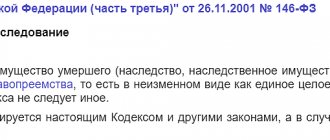Last modified: January 2021
Inheritance of a privatized apartment is one of the most common methods of transferring property from one owner to another. Owners change, but the object remains the same – housing. After the death of the owner, the successors of the deceased take over the rights. It is possible to carry out the succession procedure using legal methods in two cases: by law and by will. Each of the listed methods has characteristic features, advantages and disadvantages, and differs in the design process.
The procedure for inheriting a privatized apartment
There are two methods of succession:
- Will.
- In law.
In the first case, a person has the opportunity to dispose of his property at his own discretion. The citizen himself decides who will get the privatized apartment and in what shares. Russian legislation does not provide for the full will of the citizen when deciding the fate of acquired values. There are a number of restrictions; for example, the norms highlight a category of persons whose interests in inheritance cases are protected by the state. We are talking about a mandatory share.
The opportunity to receive it is reserved for the following persons:
- Children under 18 years of age.
- Parents who are on old-age pensions and the testator's husband/wife who is unable to work due to illness.
- Citizens who were dependent on the deceased.
The specified group of persons receives at least half of the portion that they would have inherited without a will.
A privatized apartment is inherited by will and goes to the legal successors equally if the shares are not determined.
Who can be the heir
Inheritance is carried out according to two principles:
- In law.
- According to the provisions in the will.
If the owner of the property dies without a will, the property passes to the next of kin. It is also possible to transfer inherited property to a stranger if an appropriate will has been drawn up. If inheritance is carried out by law, the property passes to people depending on the degree of their relationship with the deceased. The procedure and rules are regulated in Article 1141 of the Civil Code of the Russian Federation .
Inheritance of a privatized apartment by law
Russian law divides heirs into queues; their number is eight. It is possible to enter into legal succession provided that there are no applicants from the previous line. This can happen on various grounds, for example, recognition of the heir as unworthy in court, and so on. The basis of the order is the principle of family relationships, both blood and property. The heirs of the first stage are the husband/wife, children and parents of the deceased.
A situation may arise when the legal successor died before the opening of the inheritance or on the same day as the testator. Who has the right to inheritance in this case? The legislator introduced the concept of the right of representation. In other words, the legal successors will be the descendants of the person who, due to death, did not enter into the inheritance. By way of transmission, citizens receive part of the property intended for the deceased ancestor. If the right of representation extends to several people, then the share of the deceased will be divided between them in equal parts.
For example:
After the death of the mother, the right to inherit the privatized apartment arises from her daughters A.G. Gromova and S.S. Svetikova. However, A.G. Gromova dies in an accident without having time to formalize the succession. Gromova was not married, but she was left with two sons, Ivan Nesterov and Andrei Nesterov, the only legal successors. How is a privatized apartment inherited and what to do in this case? This happens as follows: Gromova and Svetikova each own ½ of the room. This means that the children of A.G. Gromova can claim the mother's share in equal parts. After completing all the necessary actions, each of the Nesterov brothers should receive ¼ of the living space.
Inheriting a privatized apartment without a will can have negative consequences in the form of a burden. For example, to be the subject of collateral in a loan agreement. As a general rule, citizens inherit not only the property rights of a deceased person, but also his duties.
In the event that losses from debts exceed potential profits, the successor has the opportunity, as provided by law, to refuse the inheritance.
Inheritance by will
Having a will allows you to easily resolve the issue of who will inherit a previously privatized apartment. At the same time, the legislator gives many reservations that deprive such a transaction of untouchability. We are talking about a mandatory share, refusal, and so on.
A will is a one-sided transaction. Transferring property in this way involves a number of features:
- the will is exclusively free and voluntary;
- a person expressing his will in this way must have legal capacity;
- the transaction gives rise to rights and obligations, but only after the death of the will-maker;
- The participation of a representative is not allowed; the will is made personally.
Despite the fact that a will can transfer property even to those who are not relatives of the deceased person, there are a number of restrictions.
According to the Civil Code of the Russian Federation, such a concept as testamentary refusal is provided (Article 1118). The meaning of this concept is that the testator not only transfers rights, but also obliges the heir to fulfill the property obligation at the expense of the funds received. Thus, a transaction forms not only a right to something, but also an obligation, the fulfillment of which cannot be avoided.
The owner has the right to determine who inherits the previously privatized apartment
Deadlines
The general time period for accepting an inheritance is 6 months. For persons entering into legal succession due to the refusal of applicants in the previous queue, 3.
For a child born after the opening of the inheritance, an application is submitted by the legal representative within a 6-month period from the moment of his birth. Missed deadlines can be restored through legal proceedings or with the consent of those who have already accepted the inheritance.
We recommend that you read:
Inheritance of real estate after the death of a relative
In court, the case will be considered with the involvement of citizens who have entered into legal succession; the following circumstances are subject to proof:
- The person did not know and did not have the opportunity to obtain information that the inheritance had been opened or that he had valid reasons for missing the time period established by legal norms. These include illness, long business trips, and so on.
- An application for restoration of the temporary period for entering into legal succession should not be made later than 6 months from the moment the reasons for missing it no longer exist.
Ignorance of the legislation governing the time of entry into inheritance is not recognized by the court as a circumstance worthy of attention when making a decision on missing the statute of limitations.
Provided that a citizen who missed the time allotted for receiving an inheritance manages to obtain the written consent of other legal successors to include him in the circle of heirs, such a document obliges the notary to issue a certificate.
Preemptive right
Inheritance of a share in a privatized apartment will be carried out according to the rules established by the norms, that is, in equal proportions between legal successors. So, if the property is privatized for 4, then ¼ shares are inherited. When there is no possibility of dividing residential premises in kind, the circle of those who have a priority right to receive ownership of it on account of their share when inheriting a privatized apartment is determined at the legislative level.
These are recognized as:
- Co-owners of the deceased citizen, while legal successors who lived with the testator together and used the premises, but do not have ownership rights to it, will not be taken into account.
- Heirs who were not co-owners of the property with the deceased, but used it on an ongoing basis and legally until the day of his death.
- Citizens who lived together with the testator until his death (provided they had no other living space).
A person who has received premises in the property on account of his share, and has used the pre-emptive right granted by the norms, is obliged to pay compensation to other heirs for their shares of the property.
If the apartment is privatized for two, then after the death of one of the owners, the second, provided that he is not an heir by law or will, does not have a preemptive right.
A will for a share in a privatized apartment helps to avoid disputes between legal successors, since it is the formalized will of the deceased citizen. Following entry into the inheritance, the share is registered with Rosrestr.
If there is no will
It is possible to challenge a will, but only if the court is provided with compelling reasons specified by law
Inheritance under a will occurs quickly. After the death of a person, the notary reads it and hands it over to the person or relatives who are written on it.
Such a document serves as the basis for registering ownership with government agencies, since you can become the owner when the process of registering the apartment is completed.
If there is no will, another legal process begins. It is characterized by some subtleties and a certain mechanism, without which relatives will not be able to receive an inheritance.
Legal practice shows that sometimes they refuse to draw up a will for the reason that it is necessary to pay a certain amount of money for its execution.
In addition, it must be said that the will can be challenged in court, or even canceled.
For this to happen, tough legal arguments are needed. These include violations in its preparation, as well as the presence of a close relative of a disabled person, or a minor child, whom the will deprives of real estate.
In other cases, the will is difficult to revoke.
It is important to know that a will drawn up by a person can be rewritten during his lifetime. To do this, he needs to contact a notary with an application to cancel his will and write a new document.
However, the law does not limit the testator in the number of such actions.
How is a privatized apartment divided after the death of a husband/wife?
Property acquired during marriage is considered joint property of the spouses. Otherwise may be established by agreement. Acquired material assets are considered the property of everyone until the relationship is formalized. The same rule applies to property given to a husband or wife, as well as property received by one of them as an inheritance. However, if it is proven that the value of the property of one of the parties to the marriage relationship has been increased due to common funds or investments of the other half, then it is recognized as jointly acquired.
Inheritance of a privatized apartment after the death of a spouse depends on who it is registered to. When privatizing residential premises, it is understood that the municipality will transfer the property it owns to citizens free of charge. Any person who is a party to a social rental agreement has the right to become a participant in this process or to refuse in favor of other persons.
We recommend that you read:
Inheritance of a share in a privatized apartment after death
Thus, if a wife at one time had the need to officially refuse to participate in privatization in favor of her husband, then she will not be a co-owner of the property. And since we are talking about the free acquisition of living space, jointly acquired property does not arise here. After the death of her husband, the apartment will be inherited by her along with other first-line applicants on an equal basis.
Example:
Citizen E.V. went to court in December 2021. Emelyanov with a request to allocate the marital share in jointly acquired property in the form of ¼ of the premises and exclude it from the inheritance mass.
From the circumstances of the case it followed:
- In 2012, a dwelling with an area of 70 square meters. m., in which E.V. Emelyanova and her other half Emelyanov S.A. lived under a social tenancy agreement, privatized. E.V. Emelyanova renounced her share in favor of the main tenant, her husband. The property was registered in the name of the husband.
- In 2013, the couple carried out a major renovation of the premises: they increased the living space due to the loggia, redesigned the corridor, which led to a larger kitchen, and replaced the cold and hot water supply risers. All work was legalized by the Department of Property Relations. The price of the premises has increased significantly after renovation.
- In May 2014, the marriage between E.V. was dissolved. Emelyanova and S.A. Emelyanov, the division of jointly acquired property was not carried out.
- The man died in November 2021. The deceased had a son from his first marriage, G.S. Emelyanov and daughter A.S. Emelyanov from the plaintiff.
G.S. Emelyanov, in a counterclaim, asks to divide the disputed apartment after the death of his father between him and his sister A.S. Emelyanova in equal parts. And citizen E.V. Emelyanova considers that after the death of her husband she lost the right to division of property, since several years had passed since the divorce.
The court decided to satisfy E.V.’s claim. Emelyanova for the following reasons:
- Housing is privatized at will by all persons included in the social tenancy agreement, but a person has the right to refuse his share in favor of someone else.
- After the death of the owner without a will, a privatized apartment is inherited in equal parts by the applicants of the corresponding order.
- The owner of the disputed property was the late S.A. Emelyanov, but the major repairs carried out at the expense of the spouses’ common funds significantly increased the cost of the living space, which is confirmed by the documents presented.
- The statute of limitations for the division of property acquired jointly by spouses is 3 years. In the situation under consideration, the time period when E.V. Emelyanova could apply for the division of material assets acquired in an official union, which began its course from the moment of divorce, that is, from May 2014, and ended in May 2021.
In accordance with the above arguments, the court decided to recognize the right to ¼ of the home for E.V. Emelyanova, the remaining area is transferred in equal shares to G.S. Emelyanov and A.S. Emelyanova.
Division of joint ownership into shares
If a privatized apartment is initially registered as common joint property (without determining the shares of each of the participants), then in order to obtain the right to dispose of your part, you must first allocate the share of a particular citizen in the joint property (transfer the common joint property into common shared property).
In this case, each of the co-owners has the right to dispose of their part, including leaving it as an inheritance. In the absence of disputes between heirs, privatized joint property received as an inheritance can be divided in accordance with a general agreement and this can be recorded by registering an agreement in a notary’s office. As a result of the division of a privatized apartment, each of the legal heirs receives a certificate of the right to inherit their part.
Based on the document received, each of the heirs can register their share in the common property with the registration authority (Rosreestr). Subsequently, the full owner has the right to dispose of the inheritance at his own discretion (sell, start using, rent out, donate or bequeath to his heirs).
If one of the heirs disagrees with the distribution of shares in the inherited privatized apartment, this issue must be resolved in court.
The result of filing a corresponding claim in court, as a rule, is a court decision to divide the apartment between all heirs claiming the inheritance in equal shares.
Dividing an apartment into shares does not solve the issue of using the acquired inheritance, because dividing square meters in kind can be extremely problematic, for example, three or more heirs can use a one-room or two-room apartment. Further disposal of the acquired inheritance is possible in the following ways:
- By selling the inherited share to other heirs (one of the heirs) and then receiving their share in monetary terms;
- By donating your share to another heir, if you consider such an act appropriate;
- By refusing and transferring your share of the inheritance in favor of another heir free of charge;
- By selling common shared property (privatized apartment of the testator) by joint consent of all heirs to a third party. The heirs can divide the proceeds from the sale at their discretion.
Inheritance of a non-privatized apartment
Who will get a non-privatized apartment after the death of the owner? This issue is resolved through the court. To open an inheritance, the notary is presented with documentary evidence of ownership of the property. Failure to do so will result in refusal to perform notarial acts. If the apartment is not privatized, this means that the municipality is considered its owner after the death of the responsible tenant.
In order to inherit a non-privatized apartment, you will need to justify the following facts in court:
- An application was received from the tenant about the desire to register ownership of the apartment with the relevant authority.
- A package of documents for the procedure is presented.
- Until the day of his death, the citizen did not withdraw the submitted appeal.
If all the above requirements are met, then the court, by its decision, will include the disputed area in the inheritance estate. This is the only way to inherit a non-privatized apartment. However, housing legislation provides another opportunity to become a property owner in such a situation. If the legal successor lived in the same premises as the deceased and was registered there, he has the right to contact the municipality with a request to conclude a social tenancy agreement, and subsequently an agreement for the gratuitous transfer of property.
What documents will be required?
You must provide the notary with some documents in order to make it possible to open an inheritance case:
- An official document that serves as evidence of the death of a testator.
- A will, or in its absence, a document confirming the relationship.
- The right of ownership that assigns a residential property to the testator.
- A certificate confirming the residence of the testator in the specified living space.
- Passport or other document with which you can establish your identity.
- The following are the required documents:
- An agreement indicating the privatization of the apartment.
- Passport for a residential property. To get it, you need to visit the design and inventory bureau. To guarantee the issuance of this document, you must provide an apartment privatization agreement.
- Extract from the Unified State Register.
How to register an inheritance
Registration of inheritance, regardless of whether it occurs by will or by law, requires compliance with the established procedure.
The rules of law provide for the following actions:
- Applying to a notary office.
- Entering into actual possession of property, that is, the new owner takes measures to preserve and maintain material assets passing to him by inheritance. If a dispute arises, the expenses incurred by the citizen in carrying out the above actions will be confirmation of the inheritance of the apartment.
The papers provided to the notary both for inheriting a privatized apartment without a will, and with it, will be:
- A death certificate taken from the civil registry office (civil registry office).
- Documentary evidence of a family relationship with the deceased.
- Extracts from Rosreestr for privatized real estate and the management organization confirming the absence of debt for utility and housing services.
To establish the degree of relationship, you can present documents from the registry office, a court decision, extracts from birth or house registers.
What to do if the owner dies
Receipt of real estate occurs in the manner prescribed by law:
- Collect documents that relate to the death of a relative; you also need papers confirming a sufficient degree of relationship to receive an inheritance.
- Come to an appointment with a notary.
- Take the issued certificate.
- Go through the title registration process.
When all the above requirements are successfully completed, you will become the legal owner of the apartment.
State duty on inheritance
According to the previous legislation, upon entering into the rights of inheritance of a privatized apartment, the legal successors paid a tax. Currently, payment of a state fee is required instead. Its size depends on the presence of family relationships. Thus, for heirs of the first and second stages, the amount of the mandatory fee will be 0.3% of the value of the real estate that went to the successor, but not more than 100,000 rubles.
For all others, this amount is equal to 0.6% of the price of the property, but not more than 1,000,000 rubles.











